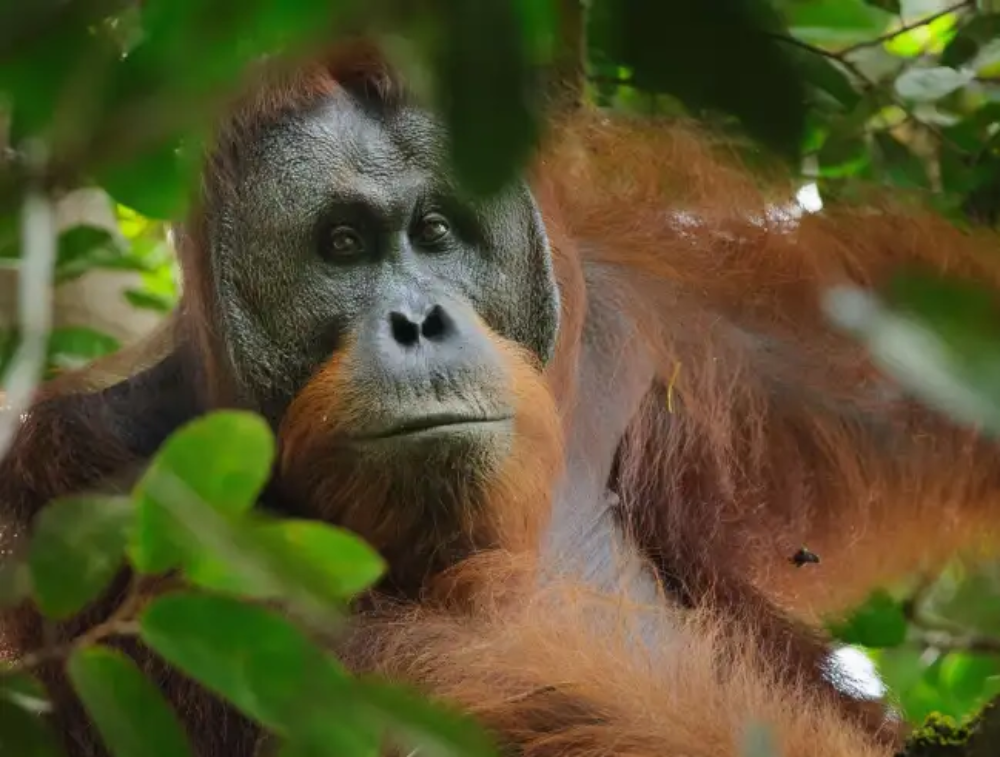In the lush, emerald canopies of Borneo’s rainforests, a creature of profound beauty and significance roams – the Bornean orangutan (*Pongo pygmaeus*). With its striking auburn fur, soulful eyes, and gentle demeanor, this great ape stands as an emblem of the awe-inspiring biodiversity of Southeast Asia. Yet, beyond its aesthetic appeal, the Bornean orangutan holds a pivotal role in the delicate ecosystem of its habitat and serves as a poignant reminder of the urgent need for conservation efforts to safeguard its future.
Evolutionary Legacy
The Bornean orangutan, one of three species of orangutans, is native to the island of Borneo, the third-largest island in the world. Also, this remarkable creature shares a common ancestor with humans, making it one of our closest relatives in the animal kingdom. Its evolutionary lineage stretches back millions of years, a testament to the resilience and adaptability of life in the dense jungles of Southeast Asia.
Habitat and Distribution of Bornean Orangutan
Borneo’s rainforests, with their towering trees and intricate network of rivers, provide the perfect habitat for the Bornean orangutan. These primates are arboreal by nature, spending most of their lives in the canopy layer, where they forage for fruits, leaves, bark, and insects. The vast expanse of Borneo’s forests once offered ample space for these majestic creatures to thrive, but rampant deforestation and habitat fragmentation have placed them at risk.

Threats to Survival
The primary threat facing Bornean orangutans is habitat loss due to deforestation, primarily driven by agricultural expansion, logging, and the development of palm oil plantations. As forests disappear at an alarming rate, orangutans are forced into ever-shrinking patches of habitat, increasing the likelihood of human-wildlife conflict and making them more vulnerable to poaching and illegal pet trade.
Conservation Efforts for Bornean Orangutan
Despite the numerous challenges they face, conservation organizations and local communities are working tirelessly to protect Bornean orangutans and their habitats. Conservation initiatives focus on various strategies, including habitat restoration, community-based conservation programs, anti-poaching efforts, and sustainable land-use practices. Additionally, ecotourism has emerged as a promising avenue for raising awareness and generating funds for orangutan conservation.
Importance to Ecosystems
As a keystone species, Bornean orangutans play a crucial role in maintaining the health and also balance of their forest ecosystems. Their diet consists mainly of fruits, and their movements through the canopy contribute to seed dispersal, helping to regenerate the forest and support the diversity of plant life. Furthermore, orangutans serve as indicators of overall ecosystem health, making their conservation essential for preserving biodiversity in Borneo’s rainforests.
Cultural Significance of the Bornean Orangutan
Beyond their ecological importance, Bornean orangutans hold profound cultural significance for the people of Borneo, particularly indigenous communities who share their ancestral lands with these great apes. Orangutans feature prominently in local folklore, symbolizing wisdom, strength, and connection to the natural world. As such, efforts to conserve orangutans often intersect with broader initiatives aimed at safeguarding indigenous rights and traditional knowledge.
The Road Ahead
While the challenges facing Bornean orangutans are daunting, there is still hope for their survival. Concerted efforts to address deforestation, combat illegal wildlife trade, and promote sustainable development offer a path forward for ensuring the long-term viability of orangutan populations. However, the task requires collaboration at local, national, and international levels, as well as a collective commitment to protecting the invaluable biodiversity of Borneo’s rainforests.
Conclusion
In the heart of Borneo’s verdant jungles, the Bornean orangutan reigns as a symbol of resilience, adaptability, and the interconnectedness of all life forms. As stewards of this planet, it is our responsibility to ensure that these magnificent creatures continue to grace the forests of Borneo for generations to come. Moreover, by working together to address the root causes of their decline and advocating for their protection, we can uphold our duty to preserve Earth’s natural wonders and secure a brighter future for all.









